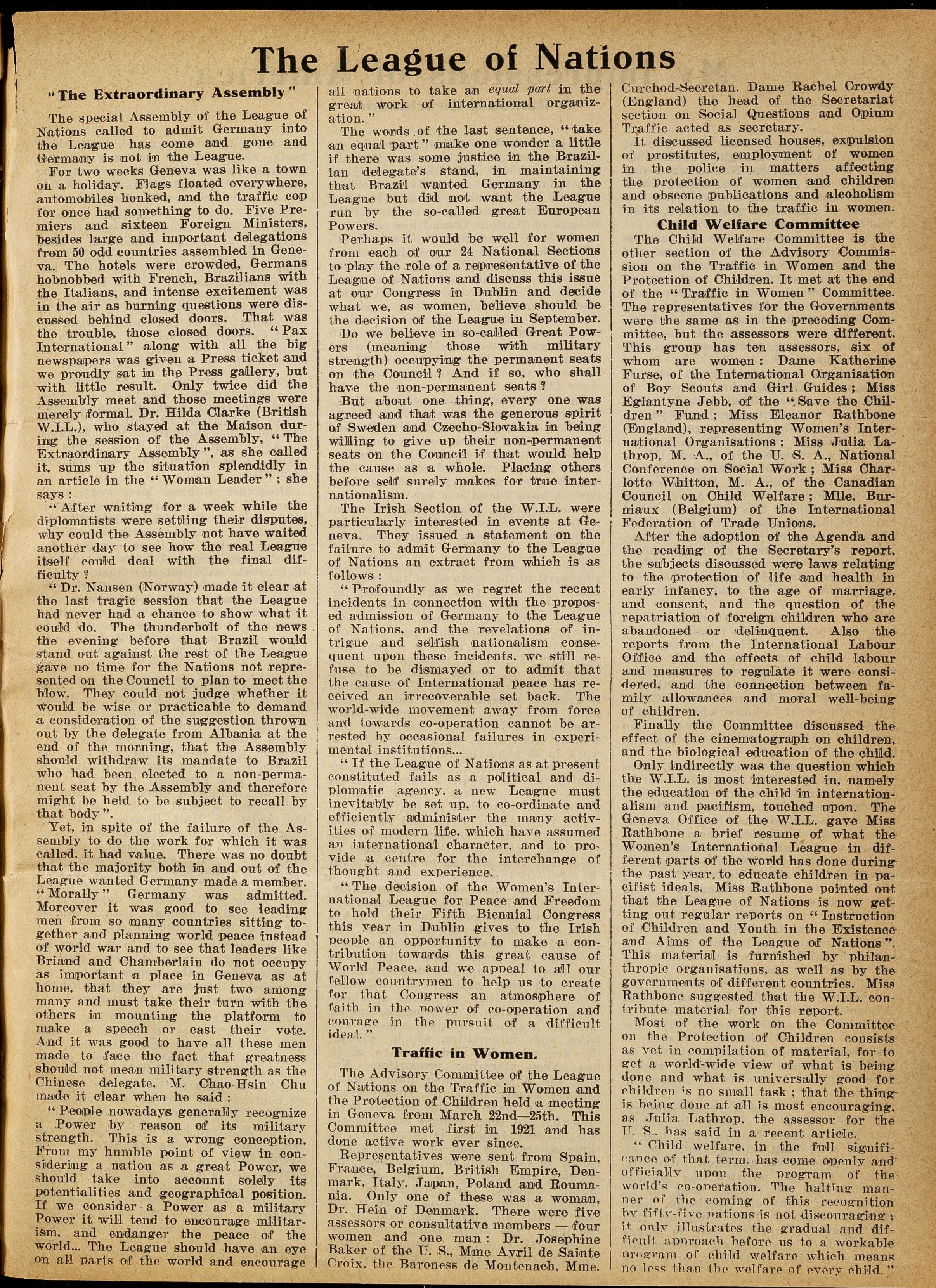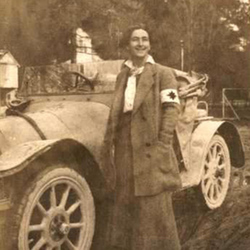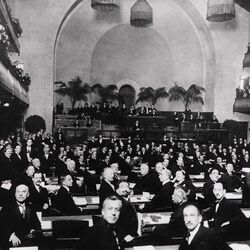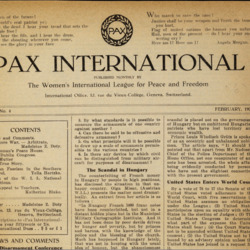The special Assembly of the League of Nations called to admit Germany into the League has come and gone and Germany is not in the League.
For two weeks Geneva was like a town on a holiday. Flags floated everywhere, automobiles honked, and the traffic cop for once had something to do. Five Premiers and sixteen Foreign Ministers, besides large and important delegations from 50 odd countries assembled in Geneva. The hotels were crowded, Germans hobnobbed with French, Brazilians with the Italians, and intense excitement was in the air as burning questions were discussed behind closed doors. That was the trouble, those closed doors. "Pax International" along with all the big newspapers was given a Press ticket and we proudly sat in the Press gallery, but with little result. Only twice did the Assembly meet and those meetings were merely formal. Dr. Hilda Clarke (British W.I.L.), who stayed at the Maison during the session of the Assembly, "The Extraordinary Assembly," as she called it, sums up the situation splendidly in an article in the "Woman Leader"; she says:
"After waiting for a week while the diplomatists were settling their disputes, why could the Assembly not have waited another day to see how the real League itself could deal with the final difficulty?
"Dr. Nansen (Norway) made it clear at the last tragic session that the League had never had a chance to show what it could do. The thunderbolt of the news the evening before that Brazil would stand out against the rest of the League gave no time for the Nations not represented on the Council to plan to meet the blow. They could not judge whether it would be wise or practicable to demand a consideration of the suggestion thrown out by the delegate from Albania at the end of the morning, that the Assembly should withdraw its mandate to Brazil who had been elected to a non-permanent seat by the Assembly and therefore might be held to be subject to recall by that body."
Yet, in spite of the failure of the Assembly to do the work for which it was called, it had value. There was no doubt that the majority both in and out of the League wanted Germany made a member. "Morally" Germany was admitted. Moreover it was good to see leading men from so many countries sitting together and planning world peace instead of world war and to see that leaders like Briand and Chamberlain do not occupy as important a place in Geneva as at home, that they are just two among many and must take their turn with the others in mounting the platform to make a speech or cast their vote. And it was good to have all these men made to face the fact that greatness should not mean military strength as the Chinese delegate, M. Chao-Hsiu Chu made it clear when he said:
"People nowadays generally recognize a Power by reason of its military strength. This is a wrong conception. From my humble point of view in considering a nation as a great Power, we should take into account solely its potentialities and geographical position. If we consider a Power as a military Power it will tend to encourage militarism, and endanger the peace of the world... The League should have an eye on all parts of the world and encourage all nations to take anequal partin the great work of international organization."
The words of the last sentence, "take an equal part" make one wonder a little if there was some justice in the Brazilian delegate's stand, in maintaining that Brazil wanted Germany in the League but did not want the League run by the so-called great European Powers.
Perhaps it would be well for women from each of our 24 National Sections to play the role of a representative of the League of Nations and discuss the issue at our Congress in Dublin and decide what we, as women, believe should be the decision of the League in September.
Do we believe in so-called Great Powers (meaning those with military strength) occupying the permanent seats on the Council? And if so, who shall have the [nonpermanent] seats?
But about one thing, every one was agreed and that was the generous spirit of Sweden and Czecho-Slovakia in being willing to give up their [nonpermanent] seats on the Council if that would help the cause as a whole. Placing others before self surely makes for true internationalism.
The Irish Section of the W.I.L. were particularly interested in events at Geneva. They issued a statement on the failure to admit Germany to the League of Nations an extract from which is as follows:
"Profoundly as we regret the recent incidents in connection with the proposed admission of Germany to the League of Nations, and the revelations of intrigue and selfish nationalism consequent upon these incidents, we still refuse to be dismayed or to admit that the cause of International peace has received an irrecoverable set back. The [worldwide] movement away from force and towards [cooperation] cannot be arrested by occasional failures in experimental institutions...
"If the League of Nations as at present constituted fails as a political and diplomatic agency, a new League must inevitably be set up to [coordinate] and efficiently administer the many activities of modern life, which have assumed an international character, and to provide a [center] for the interchange of thought and experience.
"The decision of the Women's International League for Peace and Freedom to hold their Fifth Biennial Congress this year in Dublin gives to the Irish people an opportunity to make a contribution towards this great cause of World Peace, and we appeal to all our fellow countrymen to help us to create for that Congress an atmosphere of faith in the power of [cooperation] and courage in the pursuit of a difficult ideal."
The Advisory Committee of the League of Nations on the Traffic in Women and the Protection of Children held a meeting in Geneva from March 22nd-25th. This Committee met first in 1921 and has done active work ever since.
Representatives were sent from Spain, France, Belgium, British Empire, Denmark, Italy, Japan, Poland and [Romania]. Only one of these was a woman, Dr. Hein of Denmark. There were five assessors or consultative members -- four women and one man: Dr. Josephine Baker of the U.S., Mme Avril de Sainte Croix, the Baroness de Montenach, Mme. Curchod-Secrétan. Dame Rachel Crowdy (England) the head of the Secretariat section on Social Questions and Opium Traffic acted as secretary.
It discussed licensed houses, expulsion of prostitutes, employment of women in the police in matters affecting the protection of women and children and obscene publications and alcoholism in its relation to the traffic in women.
The Child Welfare Committee is the other section of the Advisory Commission on the Traffic in Women and the Protection of Children. It met at the end of the "Traffic in Women" Committee. The representatives for the Governments were the same as in the proceding Committee, but the assessors were different. This group has ten assessors, six of whom are women: Dame Katherine Furse, of the International [Organization] of Boy Scouts and Girl Guides; Miss Eglantyne Jebb, of the "Save the Children" Fund; Miss Eleanor Rathbone (England), representing Women's International Organizations; Miss Julia Lathrop, M.A., of the U.S.A., National Conference on Social Work; Miss Charlotte Whitton, M.A., of the Canadian Council on Child Welfare; Mlle. Burniaux (Belgium) of the International Federation of Trade Unions.
After the adoption of the Agenda and the reading of the Secretary's report, the subjects discussed were laws relating to the protection of life and health in early infancy, to the age of marriage, and consent, and the question of the repatriation of foreign children who are abandoned or delinquent. Also the reports from the International Labour Office and the effects of child [labor] and measures to regulate it were considered, and the connection between family allowances and moral well-being of children.
Finally the Committee discussed the effect of the cinematograph on children, and the biological education of the child.
Only indirectly was the question which the W.I.L. is most interested in, namely the education of the child in internationalism and pacifism, touched upon. The Geneva Office of the W.I.L. gave Miss Rathbone a brief resume of what the Women's International League in different parts of the world has done during the past year to educate children in pacifist ideals. Miss Rathbone pointed out that the League of Nations is now getting out regular reports on "Instruction of Children and Youth in the Existence and Aims of the League of Nations." This material is furnished by philanthropic [organizations], as well as the governments of different countries. Miss Rathbone suggested that the W.I.L. contribute material for this report.
Most of the work on the Committee on the Protection of Children consists as yet in compilation of material, for to get a [worldwide] view of what is being done and what is universally good for children is no small task; that the thing is being done at all is most encouraging as Julia Lathrop, the assessor for the U.S., has said in a recent article.
"Child welfare, in the full significance of that term has come openly and officially upon the program of the world's [cooperation]. The halting manner of the coming of this recognition by fifty-five nations is not discouraging, it only illustrates the gradual and difficult approach before us to a workable program of child welfare which is no less than the welfare of every child."






















Comments